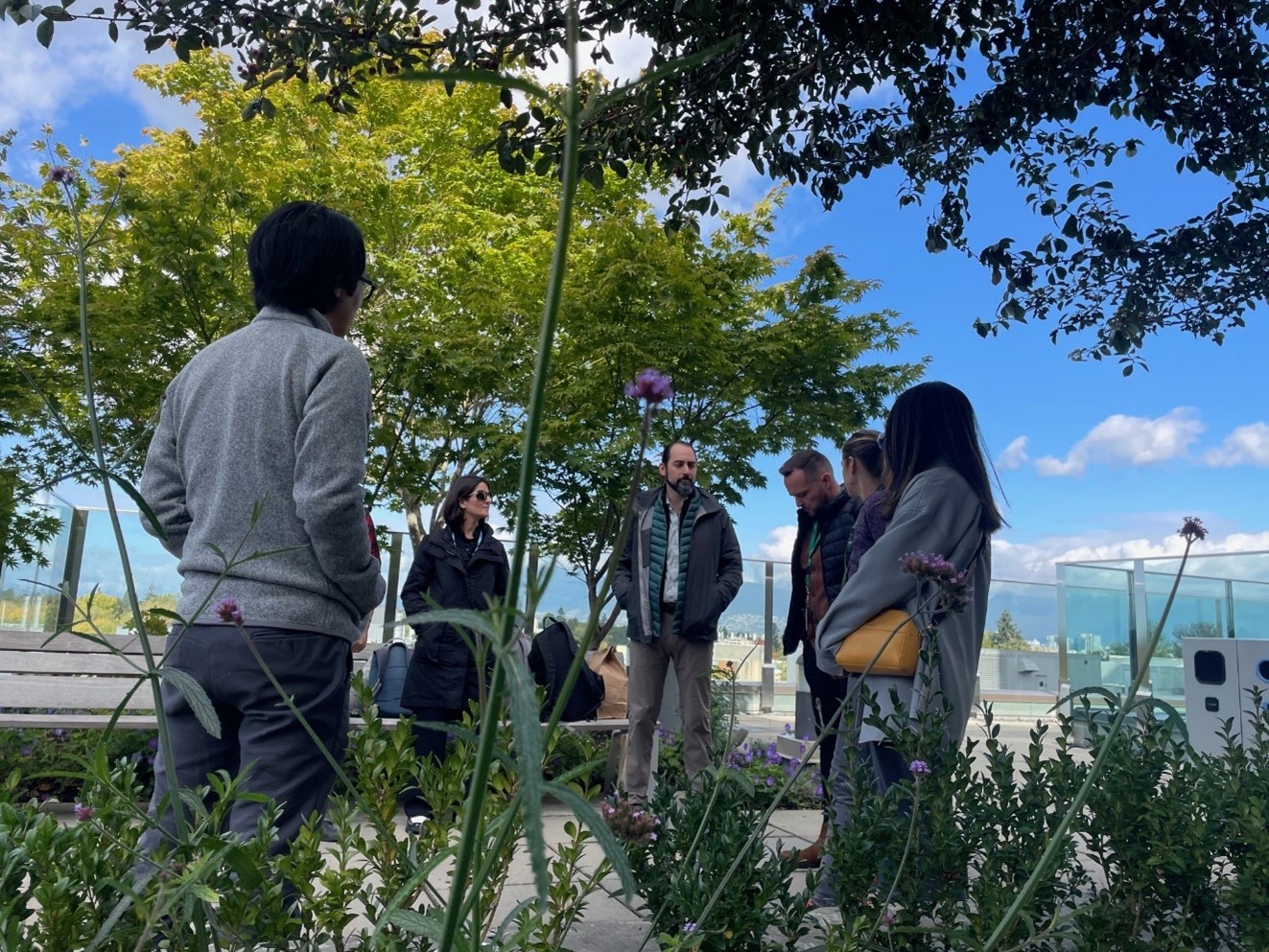
Dr. Dzung Vo, co-director of the BC Children’s Hospital Centre for Mindfulness, leads the Slocan Site Redevelopment Project team in a mindfulness walk on the rooftop garden of the Teck Acute Care Centre.
The health-care sector produces close to 5% of Canada’s greenhouse gas emissions. There are several ways of tackling this problem, through environmentally friendly approaches to construction, more efficient health-care buildings (think use of water and energy), supply chain decisions, and overall reduction of health-care use by people (through health promotion, prevention, and better coordination of care).
The new BC Children’s Hospital Centre for health complexity, scheduled to open in early 2028, is an excellent opportunity to address all of these factors.
But before focusing on concrete solutions, the project team responsible for the design and construction of the new Centre felt it important to create space and time to connect with each other about the topic of planetary health – which can be heavy and elicit strong emotions. We were able to do this through a PHSA Health Promotion Initiatives Fund grant, which we received in October 2023. Based on the bestselling book “All We Can Save”, which is a collection of writings by women leading on climate, we designed these discussions to nurture connection and encourage generous dialogue among team members. The one-hour sessions included a plant-based lunch and mindfulness practice.
During the first circle, everyone expressed feelings of hopelessness, overwhelm, burn-out, or worry about the climate crisis. These are feelings many of us carry with us to work, affecting our mental health and productivity. Experiencing connection on an emotional topic like this at work has been reassuring, powerful, and motivating.
The final circle was a partnership with Dr. Dzung Vo, co-director of th e BC Children’s Hospital Centre for Mindfulness. Dr. Vo facilitated an outdoor mindfulness practice on the rooftop patio of the Teck Acute Care Centre, a beautiful place to escape from the day-to-day, with a labyrinth, lush plantings, and quiet spaces. Dr. Vo lead a mindfulness walk and contemplation on “Love Letters to Mother Earth” by Thich Nhat Hanh, which provided an opportunity for team members to consider their relationship with Mother Earth. The project team took a pause from their busy work day and spent a few minutes paying attention to the colour of flowers, the shape of the clouds, the feeling of cool air on our cheeks. Some of us noticed a pill bug that was slowly meandering across the labyrinth, others spent time with a bumblebee.
e BC Children’s Hospital Centre for Mindfulness. Dr. Vo facilitated an outdoor mindfulness practice on the rooftop patio of the Teck Acute Care Centre, a beautiful place to escape from the day-to-day, with a labyrinth, lush plantings, and quiet spaces. Dr. Vo lead a mindfulness walk and contemplation on “Love Letters to Mother Earth” by Thich Nhat Hanh, which provided an opportunity for team members to consider their relationship with Mother Earth. The project team took a pause from their busy work day and spent a few minutes paying attention to the colour of flowers, the shape of the clouds, the feeling of cool air on our cheeks. Some of us noticed a pill bug that was slowly meandering across the labyrinth, others spent time with a bumblebee.
The team then made their way indoors to enjoy a delicious plant-based lunch in silence. Dr. Vo facilitated a mindful eating exercise and we all appreciated how our food tasted better when we ate slowly and thoughtfully.
As the Slocan Site Redevelopment Project team moves forward in our work, there is now an awareness of team members’ collective commitment to planetary health. There is also more awareness of our shared experience of facing the climate crisis. These connections are helping us take concrete actions.
Below are a few ways that the future BC Children’s Hospital Centre for health complexity and new clinical program will address planetary health:
- The new facility is required to achieve Gold Certification under Leadership in Energy and Environmental Design (LEED) V4 for Healthcare Projects, as well as meet the requirements of the City of Vancouver’s Green Building Policy. These policies use rating systems for the design, construction, operation, and maintenance of buildings, to make them as environmentally responsible as possible.
- The top two floors will use mass timber instead of concrete and steel, making the new Centre the first hybrid mass timber health-care facility in Canada. Mass timber is a low-carbon building solution that employs engineered wood products typically made of large, solid wood panels, columns, or beams.
- The team is working with the C&W and PHSA food services team to develop plant-based food offerings and strategies to avoid food waste. The menu will also include traditional Indigenous foods.
- The new clinical program will support health-care delivery closer to home through care coordination, training, and education for children with health complexity, their families, and their care teams. The program aims to reduce unnecessary use of health services (appointments, medications, acute care visits) for this complex population, while also reducing unnecessary travel through use of virtual health services.
- As part of the landscape plan for the outdoor spaces, 80% of new plants added to the space will be native plants. The plant list was co-developed with Musqueam Knowledge Keepers. The entire site, including a beautiful grove of trees, will be accessible by patients and families, providing a direct connection to nature. An Indigenous healing garden will be maintained by the Indigenous Health staff on site to support their work with Indigenous patients, families, and staff.
For more information about the new BC Children’s Hospital centre for health complexity, visit our website or email us at slocainfo@phsa.ca.